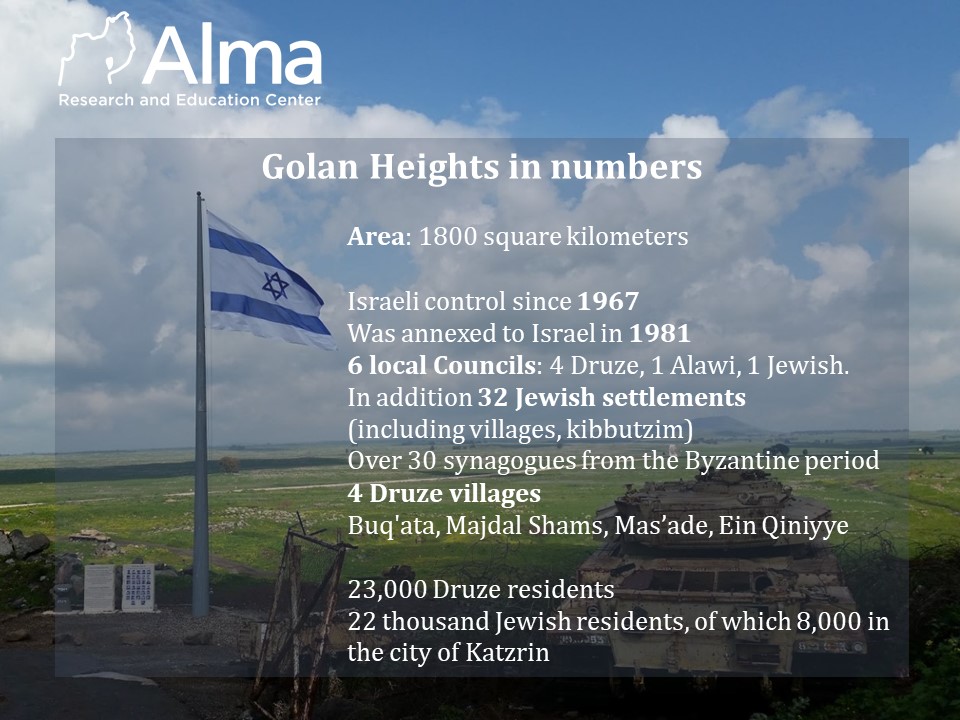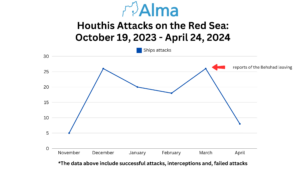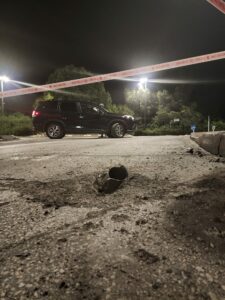[vc_row][vc_column][vc_column_text]Most of the world considers President Donald Trump’s recent decision to recognize Israel’s sovereignty over the Golan Heights problematic – or worse. All 28 members of the European Union have criticized the move and are refusing to recognize Israel’s authority in the disputed region. But Israelis are applauding the decision. They believe America now understands how critical the Golan Heights is to Israel’s current and future security during Syria’s ongoing civil war.
Israel captured the Golan Heights from Syria in 1967 during the Six-Day War. The war began with Israel making a preemptive airstrike against Egyptian forces; later, Syrian airfields were targeted after Syrian airstrikes on Israeli soil. On the fifth day of war Israeli Defense Forces took to the ground, pushing Syrian forces back from the Golan Heights and gaining control of the western part of the region.
Capturing the Golan Heights was essential in neutralizing Syria’s advantage there and ensuring the future safety of the Israeli communities established below the heights in the Hula Valley. So long as the Syrians controlled the region, those communities were in mortal danger. Artillery shelling was a frequent reality. In addition, the Syrians had previously attempted to prevent the Israelis from accessing water. This had to stop.
After Israel officially annexed the territory in 1981, four Syrian Druze villages in the Golan Heights fell under Israeli authority. But the Druze – many of whom have relatives in Syria – refused to acknowledge that authority and persisted in maintaining their Syrian identity by declining Israeli citizenship. Their status, as a result, became “Israeli residents.” Under this status, members of the Druze communities of the Golan still enjoy the benefits of Israeli law as well as a wide range of public services.
Since 1981, only 15 percent of the Druze population living in the Golan Heights have opted to become Israeli citizens. There are four main reasons why the majority refuses to assimilate into Israeli life.
The first is uncertainty. Until recently, Israel had never officially stated that it would remain in the Golan Heights. Moreover, a peace treaty between Israel and Syria was in the works — one that included Israel withdrawing from the Golan. These plans ultimately dissolved because of disagreements over the border, water resources and Syria’s support of Hezbollah. In addition, the Druze population fears that anyone who becomes an Israeli citizen will be labeled a traitor if Syria were to regain control of the Golan — and suffer the consequences.
The second reason is an extension of the first: the Druze population in the Golan Heights fears for the safety of their relatives living in Syria. The 50-year status quo in the Golan has been maintained through fear of the Syrian government. The Druze across the border in Syria are at risk of retribution by the Syrian authority. The Druze community knows that obtaining Israeli citizenship and publicly expressing loyalty to Israel isn’t dangerous just for them; it also puts their relatives living across the border in Syria at risk.
The third reason is national identity. The elders in the Druze community harbor a deep connection to their utopian homeland, where allegedly all religious sects are united – a homeland that, in their view, will eventually overcome the terrorist powers occupying Syria and begin to rebuild itself. However, the younger generation has fewer ties to the Druze in Syria, and their deep immersion in Israeli society is pulling them further and further away from their Syrian identity.[/vc_column_text][/vc_column][/vc_row][vc_row][vc_column][vc_gallery interval=”3″ images=”3522,3523,3524″ img_size=”full”][vc_column_text]Photos from the “Golan in the Heart” exhibition in Quneitra ( Syrian town about a mile from the border).
Credit to FB page: Al.baath.party.in.kounaytra[/vc_column_text][/vc_column][/vc_row][vc_row][vc_column][vc_column_text]The final reason: social exclusion. Deeply tribal, the Druze community still relies on its elders and religious leaders for guidance. These individuals wield enough influence to shun any member of the community whose behavior deviates from social norms. Once this happens, the rest of the community will follow suit and avoid associating with that person socially and professionally. Anyone who cooperates with Israel becomes a pariah overnight.
It’s important to emphasize that the Druze of the Golan are not living under Israel’s thumb. They can move freely within Israel and the Golan. They have forged deep social and economic connections with Israelis, and their villages have prospered.
For nearly 40 years the Israel-Syria border was quiet, making a truce between the two governments seem realistic. But the Syrian war changed that. Israel coped with the ravages of a civil war along its border for several years, with violence regularly spilling into its territory. Its border were marked in the past years, by the presence of Syrian opposition, Al-Qaida proxies and ISIS. The government’s victory last summer poses the most viable threat to Israel’s security, with Iran and its proxies, including Hezbollah forces positioned solely along the border, calling for the imminent destruction of Israel.
The Iranian regime entered the war in 2015 to provide the Shiite-oriented Assad regime with an influx of ground troops, funneling money and fighters from Pakistan, Afghanistan, Iraq and Hezbollah into Syria. This enabled Iran to further establish a strong presence in the country while fulfilling its desire to pose even a greater threat to Israel on its northern border with Syria.
The status of the Golan Heights was debated for years within Israel. However, Iran’s commitment to posing a growing threat to Israel helped changed public opinion about the matter. Today, most Israelis oppose returning the Golan because that would put Israeli citizens living near the Sea of Galilee in grave danger. To the Israelis, an Israeli withdraw from the Golan means “Hezbollah and IRGC swimming in the sea of Galilee”.
While Israel hailed America’s proclamation as important and brave, it is equally important to identify the opportunities it presents and examine whether they outweigh the risks. The most prominent risk the proclamation poses is the possibility of escalation on the Syria-Israel border. Iran, Syria and Hezbollah would benefit from raising tension along the border, while Iran wants to preserve its military presence in Syria and strengthen its regional position.
The Syrian government will attempt to unite its people against Israel- the common foreign enemy – and divert their attention away from the real issues plaguing their society. In addition, Syria will use the proclamation to regain legitimacy from Arab Sunni nations that have already condemned President Trump’s proclamation in the Arab League.
Hezbollah meanwhile, could use the announcement as an opportunity to boost its support base in Lebanon by refreshing its image as the leading force against Israel and the ethos of the Resistance. Moreover, Hezbollah is recruiting ex-opposition members along the border in southwestern Syria, which may diminish Israel’s recent efforts to introduce Syrians to Israel’s humanitarian spirit via the Good Neighbor Project.
Despite these risks, the truth is that president Trump’s proclamation has only accelerated developments in the Golan Heights that were already long underway: namely, Hezbollah has been trying to establish terror cells near the border for years; Iran is already fighting openly with Israel and has responded to Israeli attacks against Iranian military assets in Syria; and it’s no secret that Syria has been using the Golan issue to draw the attention away from internal issues.
However, we believe that the proclamation – with the right follow-up actions – provides more opportunity than risk.
First, it confirms that the U.S. is still involved in the region and will not permit Russia and Iran to do as they please in Syria. The U.S. might even build a military presence in the Golan Heights to offset Russia’s presence in Syria. Furthermore, the proclamation sends the message that, while it has been absent from the Middle East in recent years and plans to withdraw its troops from Syria, America will continue to support Israeli interests in the region.
Second, strengthening Israel’s sovereignty and finalizing the status of the Golan might inspire the Druze community to become citizens. Druze culture values land and freedom of religion more than national identity. Such is the case for the Druze living in Syria, Lebanon, and in the Galilee; the same can be true for the Druze living in the Golan.
Third, the proclamation may open the door for American companies to invest in the Golan. In the past few years several organizations have been promoting boycotts on brands from the Golan, including olive oil, wine, fruit, flowers and other industries. This proclamation may encourage companies to invest in the Golan as it is acknowledged by the US government as Israeli sovereignty. Moreover, it encourages the Israeli government to develop infrastructure in the Golan. Now, with authority in the Golan officially recognized, the Israeli government and American companies are more likely to invest in the area’s development. This, in turn, might also improve Europe’s perception of the region.
Since many claim that this proclamation is meaningless, and it did not receive international recognition, it must be accompanied with consistent actions. Similar legislation by the American congress that would support the administration’s policy needs to be promoted. In addition, Sunni nations should show they understand America’s position, especially due to the Iranian increasing involvement in the Middle East and the mutual interest with Israel to stop this Iranian intervention. Third, the United States and Israel must hold discussions with European nations, in which Israel must emphasize, that the unprecedented consensus to finalize the status of the Golan Heights as Israeli, derives from the fact that today’s Syria is not the same as Syria before the war. Handing over the region to the Syrian government would mean handing it over to Iran and Hezbollah. Perhaps more nations should reassess their position over the Golan, considering the developments of the past few years and the new existential threat imposed on Israel by Iran.[/vc_column_text][/vc_column][/vc_row]






